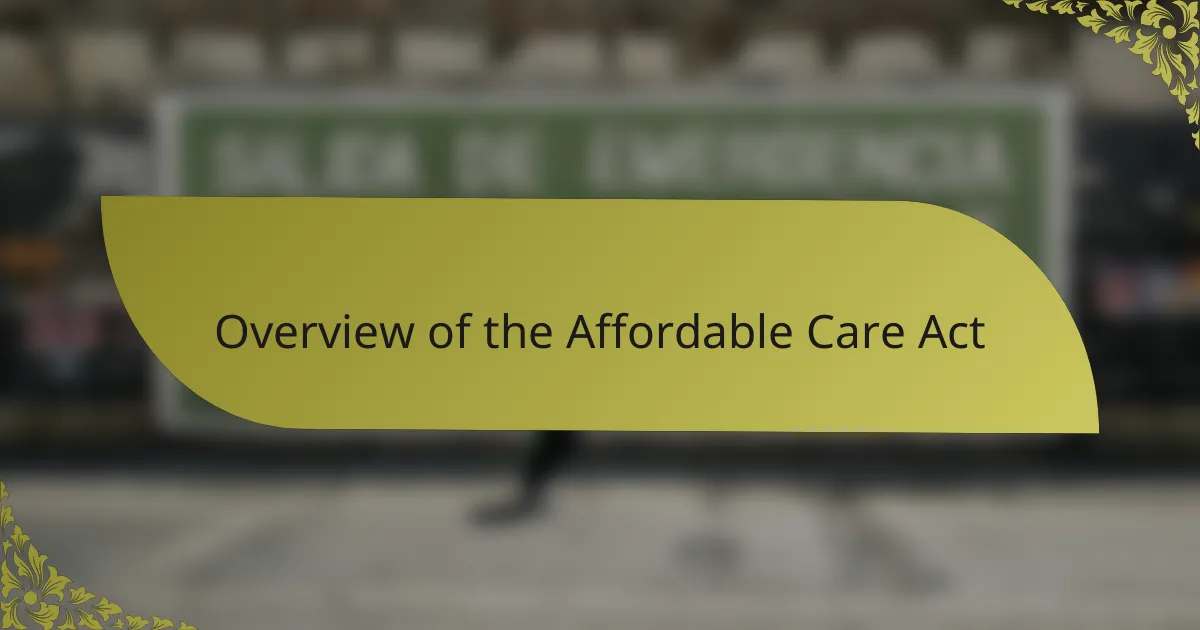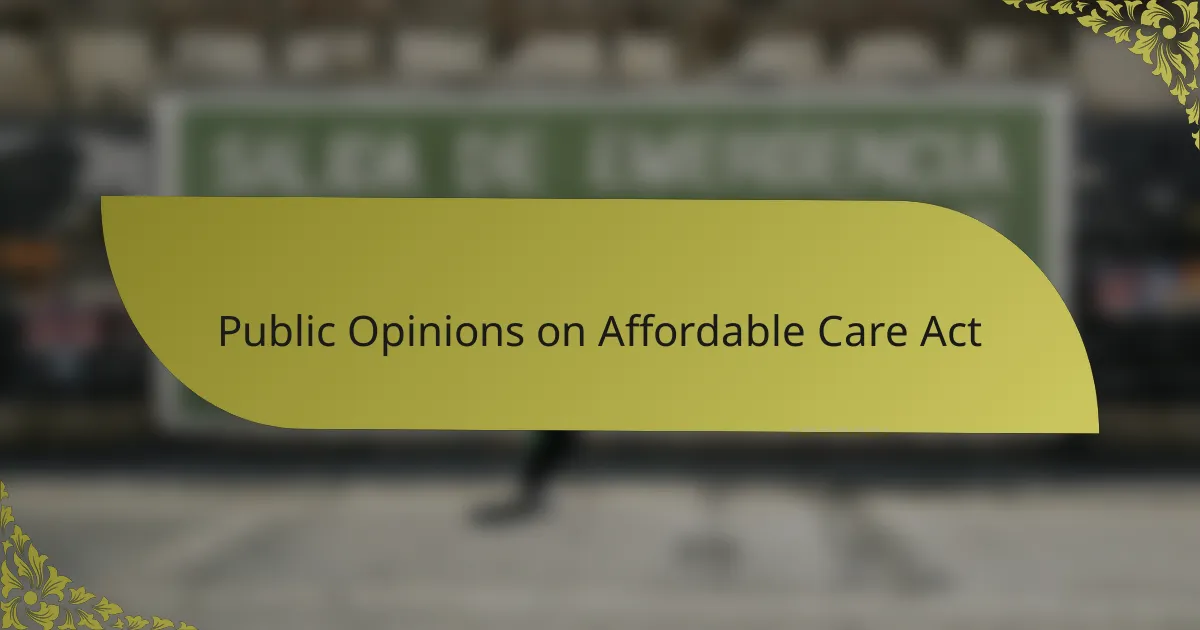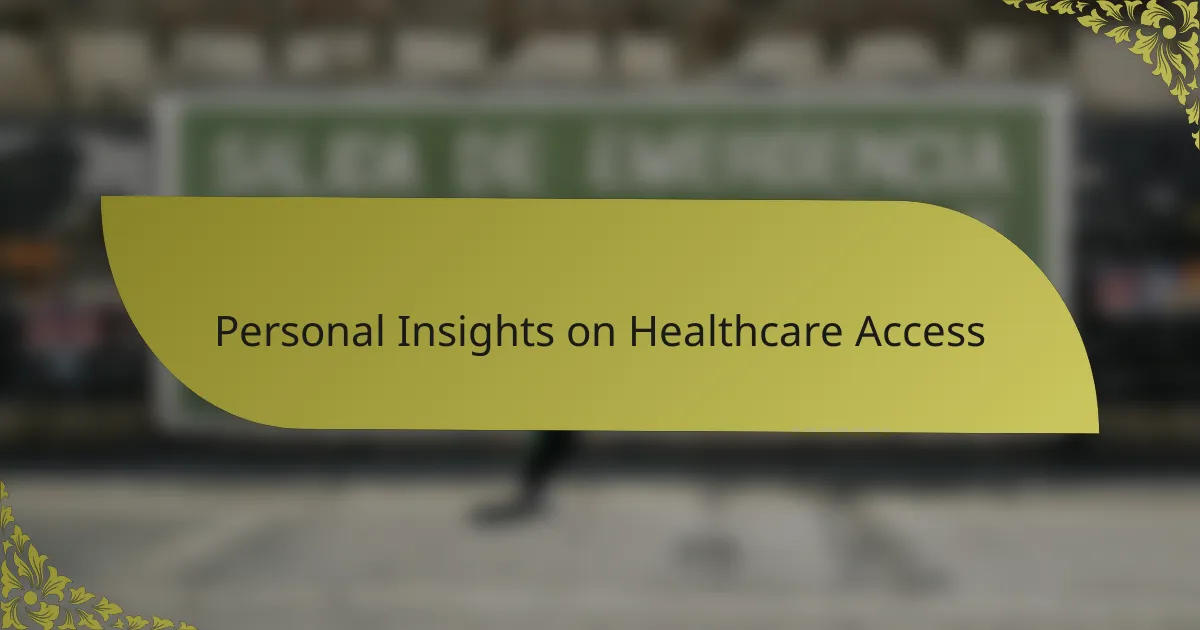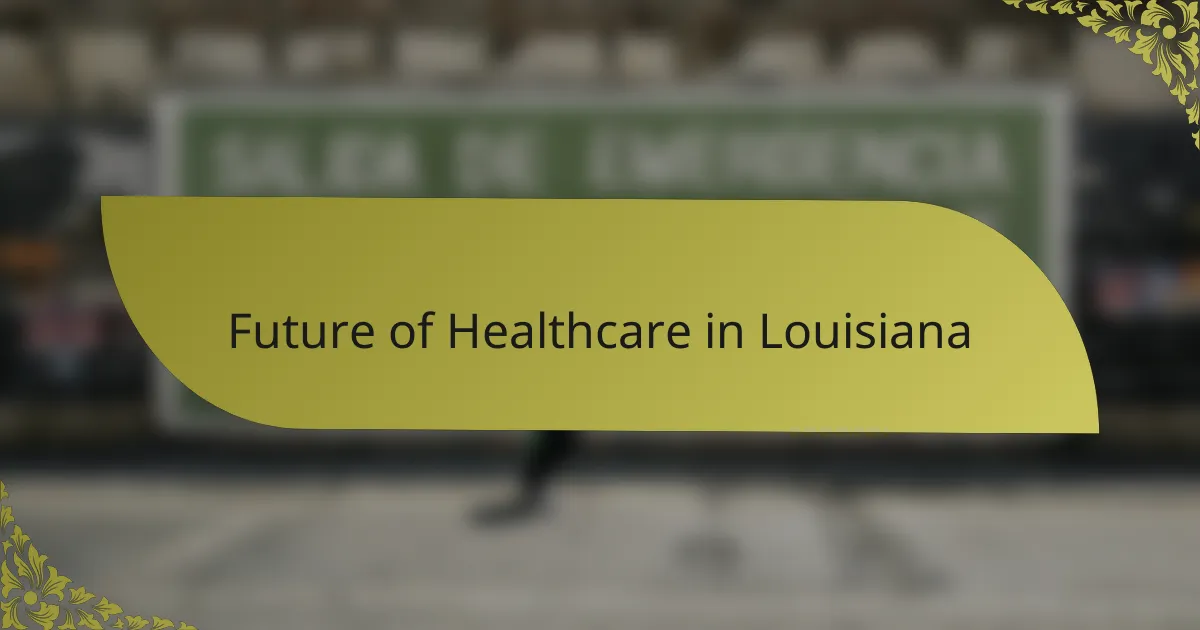Key takeaways
- The Affordable Care Act (ACA) expanded Medicaid and established Health Insurance Exchanges, significantly improving healthcare access for low-income individuals and families.
- Public opinion in Louisiana is mixed, with gratitude for expanded coverage but frustration over complexities such as rising premiums and confusing enrollment processes.
- Key stakeholders, including political leaders, healthcare providers, and nonprofit organizations, play crucial roles in advocating for effective healthcare policies and supporting community needs.
- Looking ahead, there is cautious optimism about future reforms and the potential of technology, like telehealth, to enhance accessibility and equity in healthcare services.

Overview of the Affordable Care Act
The Affordable Care Act (ACA), enacted in 2010, was a significant attempt to address the gaps in the American healthcare system. I remember discussing it at a community gathering; many folks were hopeful that it would finally make healthcare accessible for the working-class families in Louisiana. For some, it meant the difference between getting necessary medical treatment or facing financial ruin.
When I look at the key components of the ACA, a few stand out as transformative:
- Expanded Medicaid: This provision aimed to cover millions who previously fell into the coverage gap.
- Health Insurance Exchanges: States established platforms for individuals and families to compare and purchase insurance plans.
- Pre-existing Conditions: Insurers could no longer deny coverage based on pre-existing health issues, providing relief and security for many.
- Essential Health Benefits: Coverage for critical services, like maternity care and mental health support, became mandatory.
- Subsidies for Premiums: Financial assistance was made available to help low-income individuals afford health insurance.
Reflecting on these features, I find they resonated strongly with the struggles of my neighbors who once faced daunting healthcare costs. The conversations about the ACA often felt like discussions about hope and change for many in our community.

Impact on Louisiana Politics
The Affordable Care Act (ACA) has significantly influenced Louisiana politics, particularly in how healthcare is perceived and valued by constituents. In my experience, I’ve seen firsthand the struggles many Louisianans face when accessing affordable healthcare. This legislation has sparked heated debates among politicians, often reflecting the deep divides within our state, especially regarding Medicaid expansion.
It’s interesting to note that while some politicians vehemently oppose the ACA, others see it as a lifeline for our communities. Personally, I’ve witnessed many families benefit from expanded coverage, which reinforces my belief that healthcare is a right, not a privilege. Understanding these varied perspectives is essential as discussions on healthcare policy continue to unfold in the political arena.
| Aspect | Impact of the ACA in Louisiana |
|---|---|
| Medicaid Expansion | Provided healthcare coverage to hundreds of thousands of low-income residents |
| Political Divisions | Created ongoing partisan debates between Democrats and Republicans |
| Public Sentiment | Increased awareness of healthcare issues among voters |

Key Stakeholders in Louisiana
In Louisiana, several key stakeholders play pivotal roles in the discussions surrounding the Affordable Care Act. Political leaders, such as state legislators and governors, often take center stage, advocating for policies that reflect their constituents’ needs. Being a regular at town hall meetings, I’ve seen how passionate these representatives are about healthcare reform; their debates often feel like more than just politics—it resonates with the lives of the people they serve.
Healthcare providers also emerge as crucial players in this landscape. Hospitals and clinics, facing the realities of an overwhelmed system, often voice their concerns about funding and patient care. I remember a conversation with a local doctor who shared his frustration over patients lacking coverage; it reinforced my belief that healthcare professionals are not just providers but essential advocates for the community’s health and well-being.
Moreover, nonprofit organizations and advocacy groups in Louisiana tirelessly work to raise awareness and support for the ACA. These organizations often bridge the gap between policymakers and the community, ensuring that voices are heard and needs addressed. I’ve participated in several local campaigns organized by these groups, and it’s inspiring to see volunteers come together, driven by a shared vision of accessible healthcare for all. How can we ignore the impact these passionate advocates have on elevating the conversation around the ACA in our state?

Public Opinions on Affordable Care Act
Public opinion on the Affordable Care Act (ACA) is as diverse as Louisiana’s population. From my observations at town hall meetings, many residents express gratitude for the healthcare coverage it provides, particularly those with pre-existing conditions. However, I have also witnessed frustration among some who feel that the system is overly complex and not addressing their needs adequately.
The sentiment in Louisiana regarding the ACA often fluctuates, revealing a mix of support and skepticism. Here are some key points reflecting public opinions:
- Many appreciate the ACA for expanding Medicaid, allowing more low-income individuals to access healthcare.
- Concerns about rising premiums and deductibles are common, leading people to question the overall affordability of plans.
- Residents sometimes express frustration over the confusing enrollment processes and lack of clear guidance.
- Personal stories highlight the transformative impact of the ACA; for example, I recall a young mother sharing how insurance made it possible for her child to receive necessary treatment.
- While some view the ACA as a stepping stone towards better healthcare, others advocate for more significant reforms to improve the system.
This nuanced landscape reflects the ongoing debate in Louisiana as residents navigate their healthcare options.

Personal Insights on Healthcare Access
Healthcare access has always been a critical issue in Louisiana, and my thoughts on the Affordable Care Act (ACA) reflect this deeply rooted concern. I’ve seen friends and family struggle to find affordable care, often putting off necessary treatments due to cost. It’s disheartening to realize how the lack of access can impact not just physical health, but also mental well-being.
Thinking back to when the ACA was implemented, I recall feeling a sense of hope. It seemed like a step in the right direction for many in my community. However, I also recognize the ongoing debates about its effectiveness, especially given the unique healthcare challenges we face in Louisiana.
| Aspect | Impact of ACA |
|---|---|
| Insurance Coverage | Increased access to affordable insurance options for low-income individuals. |
| Preventive Care | Emphasis on preventive services, leading to earlier diagnosis and treatment. |
| Health Outcomes | Mixed results in overall healthcare outcomes, with some communities still facing barriers. |

Future of Healthcare in Louisiana
As I ponder the future of healthcare in Louisiana, it’s clear that there are significant challenges ahead. For instance, the ongoing debate around Medicaid expansion continues to inform the direction we’re headed. I often find myself questioning; how can we ensure that those who need the most support aren’t left behind again? In my conversations with neighbors, the overall sentiment is one of cautious optimism, paired with a desire for substantive change.
I also see a shift in public discourse, where more people are advocating for comprehensive reforms that go beyond the ACA. During community meetings, many express frustration over persistent barriers like high premiums and limited access to care. This gives me hope that as a society, we are beginning to understand that the future of healthcare isn’t just about policy changes; it’s about addressing the root issues that affect everyday lives.
Moreover, I can’t help but reflect on the role technology will play in shaping healthcare services moving forward. Telehealth has gained momentum, especially since the pandemic, and in my experience, it has made healthcare more accessible for rural populations like ours. The question arises: will we fully embrace these innovations to create a more equitable system? I believe we have the potential to innovate, but commitment from both our leaders and the community will be essential in this journey.